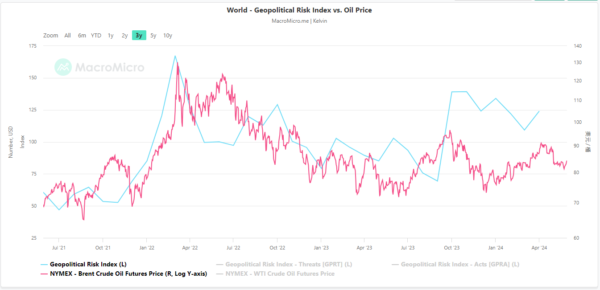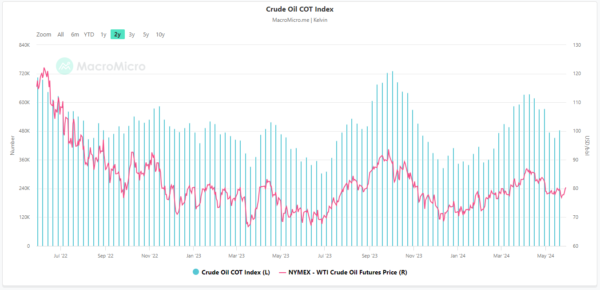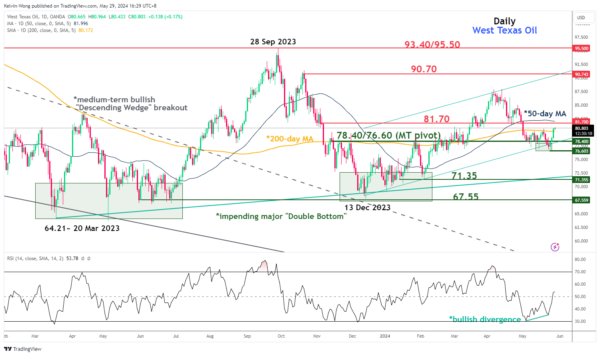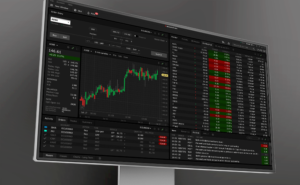- Recent additional stimulus measures from China, a reduction in elevated net long positioning from large futures speculators & an uptick in geopolitical risk premium may support higher oil prices.
- Watch the key medium-term support of US$78.40/US$76.60 on WTI crude oil.
- A break above US$81.70 may trigger a multi-week bullish impulsive upmove in WTI crude oil.
Since our last publication, benchmark oil prices have indeed shaped their respective mean reversion decline in the past two months.
The West Texas Oil (a proxy of WTI crude oil futures) shaped a corrective decline of 12.8% (high to low) from April to May after a period of strong impulsive upmove sequences for three consecutive months from January to March with an accumulated gain of 21% (low to high).
Let’s now unfold the key elements; from fundamental, positioning, and technical factors that may significantly impact West Texas Oil’s price actions.
Improved external demand for commodities from China
In the past three weeks, China’s top policymakers have unveiled several stimulus measures to prevent the economy from slipping into an entrenched mode of deflationary spiral; a $42 billion fund created by China’s central bank, PBOC to buy up unsold homes from property developers.
Most recently on Monday, 27 May, China set up the largest-ever semiconductor investment fund worth $47.5 billion (known as Big Fund III where its funding was almost twice the size of Big Fund II), the third phase of the National Integrated Circuit Industry Investment Fund to jumpstart the development of cutting-edge chip technologies for Chinese semiconductor firms amid the ongoing US-China Tech War.
All these measures may improve consumer and business sentiment in China and in turn, could drive up demand for commodities that trigger a positive feedback loop into the oil market since China is considered the second largest economy in the world.
Geopolitical risk premium is on the rise again

Fig 1: Geopolitical Risk Index with WTI crude oil futures as of Apr 2024 (Source: MacroMicro, click to enlarge chart)
Despite several attempts to get Israel and Hamas to engage in a cease-fire talk and establish a process for peace-talk negotiations, the Israel-Hamas war rages on after seven months as Israel forces continue their offensives in the Gaza strip with an increased risk of dragging other stakeholders in the Middle East such as Iran which indirectly plays a part in the disruption of the major Red Sea oil supply route which may drive up prices of oil.
One way to measure geopolitical risk premium is via the Geopolitical Risk Index (GPR) created by the US Fed economists Dario Caldara and Matteo lacoviello, The GPR index comes with a lag as it is not compiled on a real-time basis but instead on a monthly approach, it is constructed based on the number of newspaper articles that mentioned certain keywords related to geopolitical tensions.
The latest data from the GPR Index has increased to 124.04 in April after four months of decline since November 2023 reading of 139.21 (see Fig 1). Also, the movements of the GPR Index tend to move in direct tandem with the price actions of WTI crude.
Elevated large speculators’ net long positions on WTI futures have dissipated

Fig 2: Large speculators’ net open positioning with WTI crude oil futures as of 20 May 2024 (Source: MacroMicro,, click to enlarge chart)
Based on the latest Commitments of Traders data as of 20 May 2024 (compiled by Macro Micro), the aggregate net bullish open positions of large speculators in the WTI crude oil futures market of NYMEX (after offsetting the aggregate positions of large commercial hedgers) have reduced by 23% to +485,726 contracts (net long) from +634,884 contracts printed on 8 April 2024 (see Fig 12).
The previous medium-term peaks of WTI crude oil futures seen on 27 September 2023, and 12 April 2023 have coincided with a prior significant built-up in large speculators’ net long positions.
Right now, the most recent spiked-up in net long positioning on 8 April has been reduced which suggests a lower degree of bullish frenzy among large speculators towards WTI crude oil.
Given that net open large speculative positioning flows (primarily from hedge funds) are contrarian in nature which suggests that the current pace of reduction in net long positioning is likely to see an opposite positive reaction in the price actions of WTI crude oil.
Reintegration above US$78.40 with positive medium-term momentum condition

Fig 3: West Texas Oil medium-term trend as of 29 May 2024 (Source: TradingView, click to enlarge chart)
Since its last Friday, 24 May low of US$76.60, the West Texas Oil (a proxy of WTI crude oil futures) has rallied by 5.7%, a 3-day consecutive upmove to hit a current intraday high of US$80.86 at this time of the writing.
Positive price action developments in the lens of technical analysis suggest the potential start of a multi-week impulsive upmove sequence within its medium-term uptrend phase that remains intact since the 13 December 2023 low of US$67.81.
Firstly, the corrective decline of 12.8% from the 5 April 2024 high to 24 May 2024 low retested the lower boundary of the medium-term ascending channel (see Fig 3) and shaped a minor bullish reversal that reintegrated above US$78.40 and the 200-day moving average yesterday, 28 May.
Secondly, the minor bullish reversal in price actions has been accompanied by a bullish divergence condition flashed out by the daily RSI momentum indicator last Thursday, 24 May after a retest on its oversold condition on 3 May.
These observations suggest a possible built-up of medium-term bullish momentum, watch the US$78.40/US$76.60 key medium-term pivotal support on West Texas Oil, and a clearance above US$81.70 near-term resistance sees the next intermediate resistance coming in at US$90.70 (also the upper boundary of the medium-term ascending channel) in the first step.
However, failure to hold at US$76.60 invalidates the recovery scenario for another round of corrective decline to expose the major “Double Bottom” support zone of US$71.35/US$67.55.









